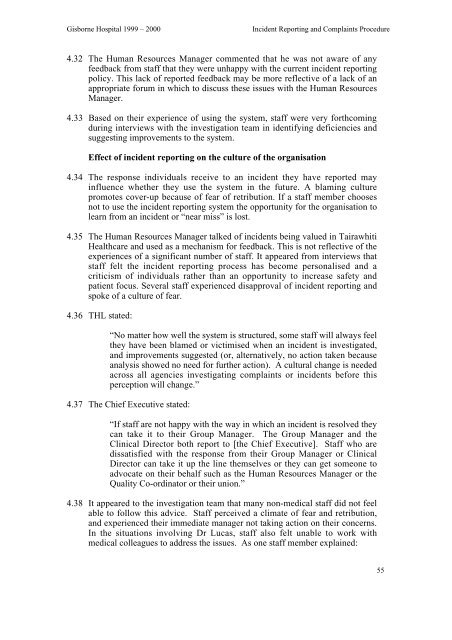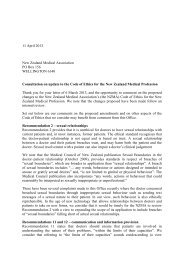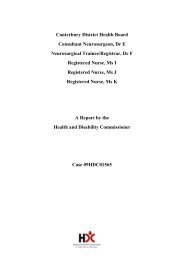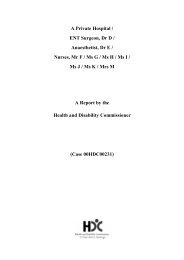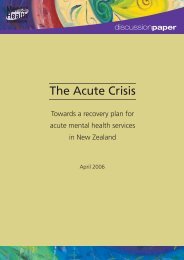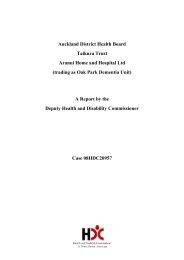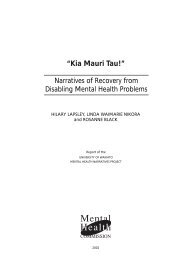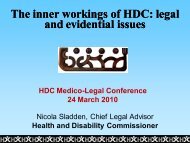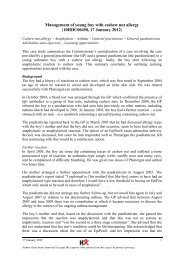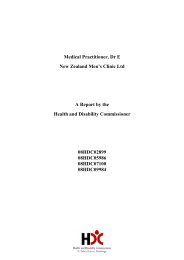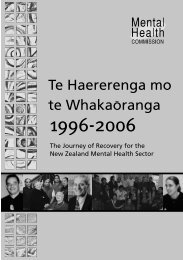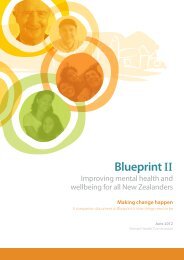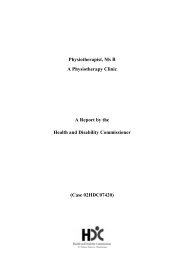Gisborne Hospital Report - Health and Disability Commissioner
Gisborne Hospital Report - Health and Disability Commissioner
Gisborne Hospital Report - Health and Disability Commissioner
You also want an ePaper? Increase the reach of your titles
YUMPU automatically turns print PDFs into web optimized ePapers that Google loves.
<strong>Gisborne</strong> <strong>Hospital</strong> 1999 – 2000<br />
Incident <strong>Report</strong>ing <strong>and</strong> Complaints Procedure<br />
4.32 The Human Resources Manager commented that he was not aware of any<br />
feedback from staff that they were unhappy with the current incident reporting<br />
policy. This lack of reported feedback may be more reflective of a lack of an<br />
appropriate forum in which to discuss these issues with the Human Resources<br />
Manager.<br />
4.33 Based on their experience of using the system, staff were very forthcoming<br />
during interviews with the investigation team in identifying deficiencies <strong>and</strong><br />
suggesting improvements to the system.<br />
Effect of incident reporting on the culture of the organisation<br />
4.34 The response individuals receive to an incident they have reported may<br />
influence whether they use the system in the future. A blaming culture<br />
promotes cover-up because of fear of retribution. If a staff member chooses<br />
not to use the incident reporting system the opportunity for the organisation to<br />
learn from an incident or “near miss” is lost.<br />
4.35 The Human Resources Manager talked of incidents being valued in Tairawhiti<br />
<strong>Health</strong>care <strong>and</strong> used as a mechanism for feedback. This is not reflective of the<br />
experiences of a significant number of staff. It appeared from interviews that<br />
staff felt the incident reporting process has become personalised <strong>and</strong> a<br />
criticism of individuals rather than an opportunity to increase safety <strong>and</strong><br />
patient focus. Several staff experienced disapproval of incident reporting <strong>and</strong><br />
spoke of a culture of fear.<br />
4.36 THL stated:<br />
“No matter how well the system is structured, some staff will always feel<br />
they have been blamed or victimised when an incident is investigated,<br />
<strong>and</strong> improvements suggested (or, alternatively, no action taken because<br />
analysis showed no need for further action). A cultural change is needed<br />
across all agencies investigating complaints or incidents before this<br />
perception will change.”<br />
4.37 The Chief Executive stated:<br />
“If staff are not happy with the way in which an incident is resolved they<br />
can take it to their Group Manager. The Group Manager <strong>and</strong> the<br />
Clinical Director both report to [the Chief Executive]. Staff who are<br />
dissatisfied with the response from their Group Manager or Clinical<br />
Director can take it up the line themselves or they can get someone to<br />
advocate on their behalf such as the Human Resources Manager or the<br />
Quality Co-ordinator or their union.”<br />
4.38 It appeared to the investigation team that many non-medical staff did not feel<br />
able to follow this advice. Staff perceived a climate of fear <strong>and</strong> retribution,<br />
<strong>and</strong> experienced their immediate manager not taking action on their concerns.<br />
In the situations involving Dr Lucas, staff also felt unable to work with<br />
medical colleagues to address the issues. As one staff member explained:<br />
55


